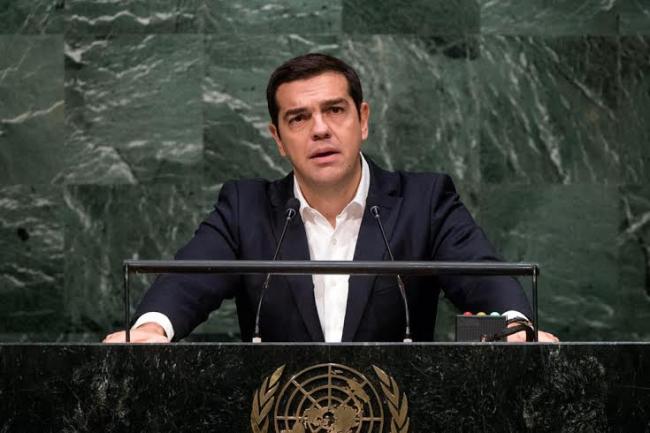He first described the consequences Greece has faced since the 2008 economic downturn. Due to structural weaknesses of its economy and its high debt and budgetary deficits, Greece was hit hard.
The country lost 25 per cent of its gross domestic product (GDP), the debt to GDP ratio grew to 180 per cent while unemployment reached 27 percent and the migration of graduates to European countries accelerated.
“What we faced was a firm commitment of some to the idea that Greece must exit the Eurozone, or that the institutional and structural reforms that we need, have to be combined with austerity measures and welfare and wage cuts,” the Prime Minister told the annual General Debate.
Greece eventually agreed to a new stabilization programme that included reforms in public administration, pension and tax system, which stabilized its economy by settling the foundation for a re-profiling of its debt. These measures hampered its society and the economy further.
“We have to realize that we need a global financial and economic system oriented to fostering national growth strategies and our post 2015 development agenda. We have to discuss the issue of debt restructuring in all competent forums – including this one – in connection to developing growth and not austerity – strategies,” he stressed.
The second challenge, said the Prime Minister, is the rising number of refugees and migrants on the move in Europe – and entering Greece in large numbers.
“Since the beginning of the year, over 300,000 people – mostly from Syria, Iraq and Afghanistan – have entered the country with the aim of transiting to Western European countries. Greece –like all other European countries – was taken aback by this development. Nevertheless, the people of Greece showed their solidarity by providing food and shelter to the refugees,” he explained.
He added that in cooperation with the European Union (EU) and other international organizations, Greece is trying to manage these flows in an effective and humane way. The country has been improving reception facilities and identification procedures as well as setting up hot spots to facilitate relocation.
He said, “Nevertheless, for some the only way to deal with this challenge is to build walls higher, to repel migrants by force or to ensure that they remain someone else's responsibility – as far away as possible. We do not believe that the future of Europe, or our world, can be built on ever-higher walls, or children dying at our doorstep."
"Neither can we forget that many of our ancestors were refugees and migrants. We cannot allow racism and xenophobia to destroy our common principles,” he asserted.
He also suggested building necessary resettlement mechanism from countries neighbouring Syria, while also supporting them directly in hosting refugees and dismantling trafficking networks.
Such a resettlement mechanism, together with the existing relocation mechanism in Europe, will give hope to these people, discouraging them from trusting traffickers.
Further, more assistance must be provided to the European countries facing the refugee crisis ‘in their effort to manage these flows.’
The Prime Minister further said that Greece is also at the centre of a third security crisis that causes this refugee crisis. Greece lies at the heart of a triangle of destabilization, with Ukraine to the North and the conflicts in Libya and in the Middle East, to the Southwest and Southeast.
“We do not have the luxury to make foreign policy choices without examining in advance, what their consequences will be,” he said.
“Nevertheless, again, we hear some, insisting that we should embark on unilateral initiatives without considering their prospects and consequences. Or leave the conflicts to be settled by themselves without contributing to stabilization or reconstruction. Yet, these are exactly the mistakes that brought us here in the first place,” he stressed.
He added that the Middle East Peace process is of key importance for the region. He declared that a new momentum for a solution must be promoted, with a view to the creation of a state of Palestine on the basis of the pre-1967 borders (with East Jerusalem as its capital) that coexists peacefully with Israel.
The Prime Minister also extended Greece’s full support to intercommunal talks to resolve the Cyprus issue, reflecting a similar suggestion made by President Nicos Anastasiades of Cyprus at the UN General Assembly earlier in the week.
Prime Minister Tsipras also reported that Greece has been making steady efforts to improve cooperation with Turkey through a wide range of initiatives, including the promotion of the dialogue on confidence-building measures.
UN Photo/Cia Pak
